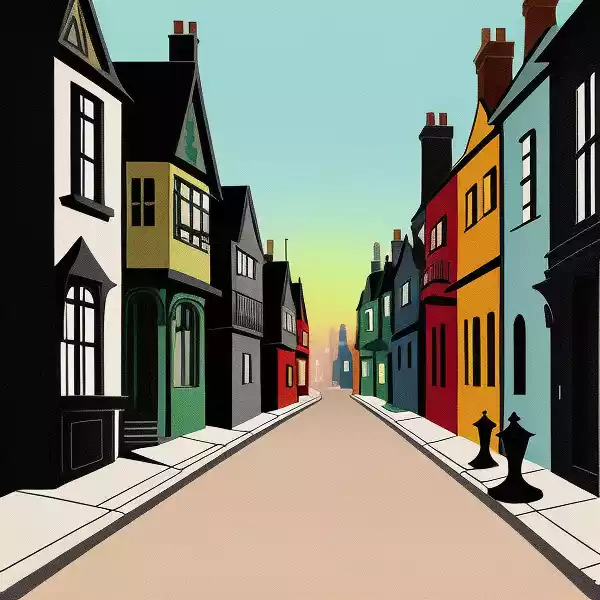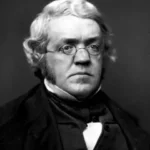 | |
Our Street | |
| Author | William Makepeace Thackeray |
|---|---|
| Published |
1832
|
| Language | English |
| Nationality | British |
| Genre | Satire, Victorian Literature |
1832 Short Story
Our Street
Our Street is an English Satire, Victorian Literature short story by British writer William Makepeace Thackeray. It was first published in 1832.
Our Street
by William Makepeace Thackeray
Our street, from the little nook which I occupy in it, and whence I and a fellow-lodger and friend of mine cynically observe it, presents a strange motley scene. We are in a state of transition. We are not as yet in the town, and we have left the country, where we were when I came to lodge with Mrs. Cammysole, my excellent landlady. I then took second-floor apartments at No. 17, Waddilove Street, and since, although I have never moved (having various little comforts about me), I find myself living at No. 46A, Pocklington Gardens.
Why is this? Why am I to pay eighteen shillings instead of fifteen? I was quite as happy in Waddilove Street; but the fact is, a great portion of that venerable old district has passed away, and we are being absorbed into the splendid new white-stuccoed Doric-porticoed genteel Pocklington quarter. Sir Thomas Gibbs Pocklington, M. P. for the borough of Lathanplaster, is the founder of the district and his own fortune. The Pocklington Estate Office is in the Square, on a line with Waddil–with Pocklington Gardens I mean. The old inn, the “Ram and Magpie,” where the market-gardeners used to bait, came out this year with a new white face and title, the shield, &c. of the “Pocklington Arms.” Such a shield it is! Such quarterings! Howard, Cavendish, De Ros, De la Zouche, all mingled together.
Even our house, 46A, which Mrs. Cammysole has had painted white in compliment to the Gardens of which it now forms part, is a sort of impostor, and has no business to be called Gardens at all. Mr. Gibbs, Sir Thomas’s agent and nephew, is furious at our daring to take the title which belongs to our betters. The very next door (No. 46, the Honorable Mrs. Mountnoddy,) is a house of five stories, shooting up proudly into the air, thirty feet above our old high-roofed low-roomed old tenement. Our house belongs to Captain Bragg, not only the landlord but the son-in-law of Mrs. Cammysole, who lives a couple of hundred yards down the street, at “The Bungalow.” He was the commander of the “Ram Chunder” East Indiaman, and has quarrelled with the Pocklingtons ever since he bought houses in the parish.
He it is who will not sell or alter his houses to suit the spirit of the times. He it is who, though he made the widow Cammysole change the name of her street, will not pull down the house next door, nor the baker’s next, nor the iron-bedstead and feather warehouse ensuing, nor the little barber’s with the pole, nor, I am ashamed to say, the tripe-shop, still standing. The barber powders the heads of the great footmen from Pocklington Gardens; they are so big that they can scarcely sit in his little premises. And the old tavern, the “East Indiaman,” is kept by Bragg’s ship-steward, and protests against the “Pocklington Arms.”
Down the road is Pocklington Chapel, Rev. Oldham Slocum–in brick, with arched windows and a wooden belfry: sober, dingy, and hideous. In the centre of Pocklington Gardens rises St. Waltheof’s, the Rev. Cyril Thuryfer and assistants–a splendid Anglo-Norman edifice, vast, rich, elaborate, bran new, and intensely old. Down Avemary Lane you may hear the clink of the little Romish chapel bell. And hard by is a large broad-shouldered Ebenezer (Rev. Jonas Gronow), out of the windows of which the hymns come booming all Sunday long.
Going westward along the line, we come presently to Comandine House (on a part of the gardens of which Comandine Gardens is about to be erected by his lordship); farther on, “The Pineries,” Mr. and Lady Mary Mango: and so we get into the country, and out of Our Street altogether, as I may say. But in the half-mile, over which it may be said to extend, we find all sorts and conditions of people–from the Right Honorable Lord Comandine down to the present topographer; who being of no rank as it were, has the fortune to be treated on almost friendly footing by all, from his lordship down to the tradesman.
OUR HOUSE IN OUR STREET
We must begin our little descriptions where they say charity should begin–at home. Mrs. Cammysole, my landlady, will be rather surprised when she reads this, and finds that a good-natured tenant, who has never complained of her impositions for fifteen years, understands every one of her tricks, and treats them, not with anger, but with scorn–with silent scorn.
On the 18th of December, 1837, for instance, coming gently down stairs, and before my usual wont, I saw you seated in my arm-chair, peeping into a letter that came from my aunt in the country, just as if it had been addressed to you, and not to “M. A. Titmarsh, Esq.” Did I make any disturbance? far from it; I slunk back to my bedroom (being enabled to walk silently in the beautiful pair of worsted slippers Miss Penelope J–s worked for me: they are worn out now, dear Penelope!) and then rattling open the door with a great noise, descending the stairs, singing “Son vergin vezzosa” at the top of my voice. You were not in my sitting-room, Mrs. Cammysole, when I entered that apartment.
You have been reading all my letters, papers, manuscripts, brouillons of verses, inchoate articles for the Morning Post and Morning Chronicle, invitations to dinner and tea–all my family letters, all Eliza Townley’s letters, from the first, in which she declared that to be the bride of her beloved Michelagnolo was the fondest wish of her maiden heart, to the last, in which she announced that her Thomas was the best of husbands, and signed herself “Eliza Slogger;” all Mary Farmer’s letters, all Emily Delamere’s; all that poor foolish old Miss MacWhirter’s, whom I would as soon marry as —-: in a word, I know that you, you hawk-beaked, keen-eyed, sleepless, indefatigable old Mrs. Cammysole, have read all my papers for these fifteen years.
I know that you cast your curious old eyes over all the manuscripts which you find in my coat-pockets and those of my pantaloons, as they hang in a drapery over the door-handle of my bedroom.
I know that you count the money in my green and gold purse, which Lucy Netterville gave me, and speculate on the manner in which I have laid out the difference between to-day and yesterday.
I know that you have an understanding with the laundress (to whom you say that you are all-powerful with me), threatening to take away my practice from her, unless she gets up gratis some of your fine linen.
I know that we both have a pennyworth of cream for breakfast, which is brought in in the same little can; and I know who has the most for her share.
I know how many lumps of sugar you take from each pound as it arrives. I have counted the lumps, you old thief, and for years have never said a word, except to Miss Clapperclaw, the first-floor lodger. Once I put a bottle of pale brandy into that cupboard, of which you and I only have keys, and the liquor wasted and wasted away until it was all gone. You drank the whole of it, you wicked old woman. You a lady, indeed!
I know your rage when they did me the honor to elect me a member of the “Poluphloisboiothalasses Club,” and I ceased consequently to dine at home. When I DID dine at home,–on a beefsteak let us say,–I should like to know what you had for supper. You first amputated portions of the meat when raw; you abstracted more when cooked. Do you think I was taken in by your flimsy pretences? I wonder how you could dare to do such things before your maids (you a clergyman’s daughter and widow, indeed), whom you yourself were always charging with roguery.
Yes, the insolence of the old woman is unbearable, and I must break out at last. If she goes off in a fit at reading this, I am sure I shan’t mind. She has two unhappy wenches, against whom her old tongue is clacking from morning till night: she pounces on them at all hours. It was but this morning at eight, when poor Molly was brooming the steps, and the baker paying her by no means unmerited compliments, that my landlady came whirling out of the ground-floor front, and sent the poor girl whimpering into the kitchen.
Were it but for her conduct to her maids I was determined publicly to denounce her. These poor wretches she causes to lead the lives of demons; and not content with bullying them all day, she sleeps at night in the same room with them, so that she may have them up before daybreak, and scold them while they are dressing.
Certain it is, that between her and Miss Clapperclaw, on the first floor, the poor wenches lead a dismal life.
It is to you that I owe most of my knowledge of our neighbors; from you it is that most of the facts and observations contained in these brief pages are taken. Many a night, over our tea, have we talked amiably about our neighbors and their little failings; and as I know that you speak of mine pretty freely, why, let me say, my dear Bessy, that if we have not built up Our Street between us, at least we have pulled it to pieces.
THE BUNGALOW–CAPTAIN AND MRS. BRAGG.
Long, long ago, when Our Street was the country–a stagecoach between us and London passing four times a day–I do not care to own that it was a sight of Flora Cammysole’s face, under the card of her mamma’s “Lodgings to Let,” which first caused me to become a tenant of Our Street. A fine good-humored lass she was then; and I gave her lessons (part out of the rent) in French and flower-painting. She has made a fine rich marriage since, although her eyes have often seemed to me to say, “Ah, Mr. T., why didn’t you, when there was yet time, and we both of us were free, propose–you know what?” “Psha! Where was the money, my dear madam?”
Captain Bragg, then occupied in building Bungalow Lodge–Bragg, I say, living on the first floor, and entertaining sea-captains, merchants, and East Indian friends with his grand ship’s plate, being disappointed in a project of marrying a director’s daughter, who was also a second cousin once removed of a peer,–sent in a fury for Mrs. Cammysole, his landlady, and proposed to marry Flora off-hand, and settle four hundred a year upon her. Flora was ordered from the back-parlor (the ground-floor occupies the second-floor bedroom), and was on the spot made acquainted with the splendid offer which the first-floor had made her. She has been Mrs. Captain Bragg these twelve years.
Bragg to this day wears anchor-buttons, and has a dress-coat with a gold strap for epaulets, in case he should have a fancy to sport them. His house is covered with portraits, busts, and miniatures of himself. His wife is made to wear one of the latter. On his sideboard are pieces of plate, presented by the passengers of the “Ram Chunder” to Captain Bragg: “The ‘Ram Chunder’ East Indiaman, in a gale, off Table Bay;” “The Outward-bound Fleet, under convoy of her Majesty’s frigate ‘Loblollyboy,’ Captain Gutch, beating off the French squadron, under Commodore Leloup (the ‘Ram Chunder,’ S.E. by E., is represented engaged with the ‘Mirliton’ corvette);” “The ‘Ram Chunder’ standing into the Hooghly, with Captain Bragg, his telescope and speaking-trumpet, on the poop;” “Captain Bragg presenting the Officers of the ‘Ram Chunder’ to General Bonaparte at St. Helena–TITMARSH” (this fine piece was painted by me when I was in favor with Bragg); in a word, Bragg and the “Ram Chunder” are all over the house.
Although I have eaten scores of dinners at Captain Bragg’s charge, yet his hospitality is so insolent, that none of us who frequent his mahogany feel any obligation to our braggart entertainer.
After he has given one of his great heavy dinners he always takes an opportunity to tell you, in the most public way, how many bottles of wine were drunk. His pleasure is to make his guests tipsy, and to tell everybody how and when the period of inebriation arose. And Miss Clapperclaw tells me that he often comes over laughing and giggling to her, and pretending that he has brought ME into this condition–a calumny which I fling contemptuously in his face.
He scarcely gives any but men’s parties, and invites the whole club home to dinner. What is the compliment of being asked, when the whole club is asked too, I should like to know? Men’s parties are only good for boys. I hate a dinner where there are no women. Bragg sits at the head of his table, and bullies the solitary Mrs. Bragg.
He entertains us with stories of storms which he, Bragg, encountered–of dinners which he, Bragg, has received from the Governor-General of India–of jokes which he, Bragg, has heard; and however stale or odious they may be, poor Mrs. B. is always expected to laugh.
Woe be to her if she doesn’t, or if she laughs at anybody else’s jokes. I have seen Bragg go up to her and squeeze her arm with a savage grind of his teeth, and say, with an oath, “Hang it, madam, how dare you laugh when any man but your husband speaks to you? I forbid you to grin in that way. I forbid you to look sulky. I forbid you to look happy, or to look up, or to keep your eyes down to the ground. I desire you will not be trapesing through the rooms. I order you not to sit as still as a stone.” He curses her if the wine is corked, or if the dinner is spoiled, or if she comes a minute too soon to the club for him, or arrives a minute too late. He forbids her to walk, except upon his arm. And the consequence of his ill treatment is, that Mrs. Cammysole and Mrs. Bragg respect him beyond measure, and think him the first of human beings.
“I never knew a woman who was constantly bullied by her husband who did not like him the better for it,” Miss Clapperclaw says. And though this speech has some of Clapp’s usual sardonic humor in it, I can’t but think there is some truth in the remark.
LEVANT HOUSE CHAMBERS.
MR. RUMBOLD, A.R.A., AND MISS RUMBOLD.
When Lord Levant quitted the country and this neighborhood, in which the tradesmen still deplore him, No. 56, known as Levantine House, was let to the “Pococurante Club,” which was speedily bankrupt (for we are too far from the centre of town to support a club of our own); it was subsequently hired by the West Diddlesex Railroad; and is now divided into sets of chambers, superintended by an acrimonious housekeeper, and by a porter in a sham livery: whom, if you don’t find him at the door, you may as well seek at the “Grapes” public-house, in the little lane round the corner. He varnishes the japan-boots of the dandy lodgers; reads Mr. Pinkney’s Morning Post before he lets him have it; and neglects the letters of the inmates of the chambers generally.
The great rooms, which were occupied as the salons of the noble Levant, the coffee-rooms of the “Pococurante” (a club where the play was furious, as I am told), and the board-room and manager’s-room of the West Diddlesex, are tenanted now by a couple of artists: young Pinkney the miniaturist, and George Rumbold the historical painter. Miss Rumbold, his sister lives with him, by the way; but with that young lady of course we have nothing to do.
I knew both these gentlemen at Rome, where George wore a velvet doublet and a beard down to his chest, and used to talk about high art at the “Caffe Greco.” How it smelled of smoke, that velveteen doublet of his, with which his stringy red beard was likewise perfumed! It was in his studio that I had the honor to be introduced to his sister, the fair Miss Clara: she had a large casque with a red horse-hair plume (I thought it had been a wisp of her brother’s beard at first), and held a tin-headed spear in her hand, representing a Roman warrior in the great picture of “Caractacus” George was painting–a piece sixty-four feet by eighteen. The Roman warrior blushed to be discovered in that attitude: the tin-headed spear trembled in the whitest arm in the world. So she put it down, and taking off the helmet also, went and sat in a far corner of the studio, mending George’s stockings; whilst we smoked a couple of pipes, and talked about Raphael being a good deal overrated.
I think he is; and have never disguised my opinion about the “Transfiguration.”. And all the time we talked, there were Clara’s eyes looking lucidly out from the dark corner in which she was sitting, working away at the stockings. The lucky fellow! They were in a dreadful state of bad repair when she came out to him at Rome, after the death of their father, the Reverend Miles Rumbold.
George, while at Rome, painted “Caractacus;” a picture of “Non Angli sed Angeli” of course; a picture of “Alfred in the Neatherd’s Cottage,” seventy-two feet by forty-eight–(an idea of the gigantic size and Michel-Angelesque proportions of this picture may be formed, when I state that the mere muffin, of which the outcast king is spoiling the baking, is two feet three in diameter) and the deaths of Socrates, of Remus, and of the Christians under Nero respectively. I shall never forget how lovely Clara looked in white muslin, with her hair down, in this latter picture, giving herself up to a ferocious Carnifex (for which Bob Gaunter the architect sat), and refusing to listen to the mild suggestions of an insinuating Flamen: which character was a gross caricature of myself.
None of George’s pictures sold. He has enough to tapestry Trafalgar Square. He has painted, since he came back to England, “The Flaying of Marsyas,” “The Smothering of the Little Boys in the Tower,” “A Plague Scene during the Great Pestilence,” “Ugolino on the Seventh Day after he was deprived of Victuals,” &c. For although these pictures have great merit, and the writhings of Marsyas, the convulsions of the little prince, the look of agony of St. Lawrence on the gridiron, &c. are quite true to nature, yet the subjects somehow are not agreeable; and if he hadn’t a small patrimony, my friend George would starve.
Fondness for art leads me a great deal to his studio. George is a gentleman, and has very good friends, and good pluck too. When we were at Rome, there was a great row between him and young Heeltap, Lord Boxmoor’s son, who was uncivil to Miss Rumbold; (the young scoundrel–had I been a fighting man, I should like to have shot him myself!). Lady Betty Bulbul is very fond of Clara; and Tom Bulbul, who took George’s message to Heeltap, is always hanging about the studio. At least I know that I find the young jackanapes there almost every day, bringing a new novel, or some poisonous French poetry, or a basket of flowers, or grapes, with Lady Betty’s love to her dear Clara–a young rascal with white kids, and his hair curled every morning. What business has HE to be dangling about George Rumbold’s premises, and sticking up his ugly pug-face as a model for all George’s pictures?
Miss Clapperclaw says Bulbul is evidently smitten, and Clara too. What! would she put up with such a little fribble as that, when there is a man of intellect and taste who–but I won’t believe it. It is all the jealousy of women.
SOME OF THE SERVANTS IN OUR STREET.
These gentlemen have two clubs in our quarter–for the butlers at the “Indiaman,” and for the gents in livery at the “Pocklington Arms”–of either of which societies I should like to be a member. I am sure they could not be so dull as our club at the “Poluphloisboio,” where one meets the same neat, clean, respectable old fogies every day.
But with the best wishes, it is impossible for the present writer to join either the “Plate Club” or the “Uniform Club” (as these reunions are designated); for one could not shake hands with a friend who was standing behind your chair, or nod a How-d’ye-do? to the butler who was pouring you out a glass of wine;–so that what I know about the gents in our neighborhood is from mere casual observation. For instance, I have a slight acquaintance with (1) Thomas Spavin, who commonly wears an air of injured innocence, and is groom to Mr. Joseph Green, of Our Street. “I tell why the brougham ‘oss is out of condition, and why Desperation broke out all in a lather! ‘Osses will, this ‘eavy weather; and Desperation was always the most mystest hoss I ever see.–I take him out with Mr. Anderson’s ‘ounds–I’m above it. I allis was too timid to ride to ‘ounds by natur; and Colonel Sprigs’ groom as says he saw me, is a liar,” &c. &c.
Such is the tenor of Mr. Spavin’s remarks to his master. Whereas all the world in Our Street knows that Mr. Spavin spends at least a hundred a year in beer; that he keeps a betting-book; that he has lent Mr. Green’s black brougham horse to the omnibus driver; and, at a time when Mr. G. supposed him at the veterinary surgeon’s, has lent him to a livery stable, which has let him out to that gentleman himself, and actually driven him to dinner behind his own horse.
This conduct I can understand, but I cannot excuse–Mr. Spavin may; and I leave the matter to be settled betwixt himself and Mr. Green.
The second is Monsieur Sinbad, Mr. Clarence Bulbul’s man, whom we all hate Clarence for keeping.
Mr. Sinbad is a foreigner, speaking no known language, but a mixture of every European dialect–so that he may be an Italian brigand, or a Tyrolese minstrel, or a Spanish smuggler, for what we know. I have heard say that he is neither of these, but an Irish Jew.
He wears studs, hair-oil, jewellery, and linen shirt-fronts, very finely embroidered, but not particular for whiteness. He generally appears in faded velvet waistcoats of a morning, and is always perfumed with stale tobacco. He wears large rings on his hands, which look as if he kept them up the chimney.
He does not appear to do anything earthly for Clarence Bulbul, except to smoke his cigars, and to practise on his guitar. He will not answer a bell, nor fetch a glass of water, nor go of an errand on which, au reste, Clarence dares not send him, being entirely afraid of his servant, and not daring to use him, or to abuse him, or to send him away.
3. Adams–Mr. Champignon’s man–a good old man in an old livery coat with old worsted lace–so very old, deaf, surly, and faithful, that you wonder how he should have got into the family at all; who never kept a footman till last year, when they came into the street.
Miss Clapperclaw says she believes Adams to be Mrs. Champignon’s father, and he certainly has a look of that lady; as Miss C. pointed out to me at dinner one night, whilst old Adams was blundering about amongst the hired men from Gunter’s, and falling over the silver dishes.
4. Fipps, the buttoniest page in all the street: walks behind Mrs. Grimsby with her prayer-book, and protects her.
“If that woman wants a protector” (a female acquaintance remarks), “heaven be good to us! She is as big as an ogress, and has an upper lip which many a cornet of the Lifeguards might envy. Her poor dear husband was a big man, and she could beat him easily; and did too. Mrs. Grimsby indeed! Why, my dear Mr. Titmarsh, it is Glumdalca walking with Tom Thumb.”
This observation of Miss C.’s is very true, and Mrs. Grimsby might carry her prayer-book to church herself. But Miss Clapperclaw, who is pretty well able to take care of herself too, was glad enough to have the protection of the page when she went out in the fly to pay visits, and before Mrs. Grimsby and she quarrelled at whist at Lady Pocklington’s.
After this merely parenthetic observation, we come to 5, one of her ladyship’s large men, Mr. Jeames–a gentleman of vast stature and proportions, who is almost nose to nose with us as we pass her ladyship’s door on the outside of the omnibus. I think Jeames has a contempt for a man whom he witnesses in that position. I have fancied something like that feeling showed itself (as far as it may in a well-bred gentleman accustomed to society) in his behavior, while waiting behind my chair at dinner.
But I take Jeames to be, like most giants, good-natured, lazy, stupid, soft-hearted, and extremely fond of drink. One night, his lady being engaged to dinner at Nightingale House, I saw Mr. Jeames resting himself on a bench at the “Pocklington Arms:” where, as he had no liquor before him, he had probably exhausted his credit.
Little Spitfire, Mr. Clarence Bulbul’s boy, the wickedest little varlet that ever hung on to a cab, was “chaffing” Mr. Jeames, holding up to his face a pot of porter almost as big as the young potifer himself.
“Vill you now, Big’un, or von’t you?” Spitfire said. “If you’re thirsty, vy don’t you say so and squench it, old boy?”
“Don’t ago on making fun of me–I can’t abear chaffin’,” was the reply of Mr. Jeames, and tears actually stood in his fine eyes as he looked at the porter and the screeching little imp before him.
Spitfire (real name unknown) gave him some of the drink: I am happy to say Jeames’s face wore quite a different look when it rose gasping out of the porter; and I judge of his dispositions from the above trivial incident.
The last boy in the sketch, 6, need scarcely be particularized. Doctor’s boy; was a charity-boy; stripes evidently added on to a pair of the doctor’s clothes of last year–Miss Clapperclaw pointed this out to me with a giggle. Nothing escapes that old woman.
As we were walking in Kensington Gardens, she pointed me out Mrs. Bragg’s nursery-maid, who sings so loud at church, engaged with a Lifeguardsman, whom she was trying to convert probably. My virtuous friend rose indignant at the sight.
“That’s why these minxes like Kensington Gardens,” she cried. “Look at the woman: she leaves the baby on the grass, for the giant to trample upon; and that little wretch of a Hastings Bragg is riding on the monster’s cane.”
Miss C. flew up and seized the infant, waking it out of its sleep, and causing all the gardens to echo with its squalling. “I’ll teach you to be impudent to me,” she said to the nursery-maid, with whom my vivacious old friend, I suppose, has had a difference; and she would not release the infant until she had rung the bell of Bungalow Lodge, where she gave it up to the footman.
The giant in scarlet had slunk down towards Knightsbridge meanwhile. The big rogues are always crossing the Park and the Gardens, and hankering about Our Street.
WHAT SOMETIMES HAPPENS IN OUR STREET.
It was before old Hunkington’s house that the mutes were standing, as I passed and saw this group at the door. The charity-boy with the hoop is the son of the jolly-looking mute; he admires his father, who admires himself too, in those bran-new sables. The other infants are the spawn of the alleys about Our Street. Only the parson and the typhus fever visit those mysterious haunts, which lie crouched about our splendid houses like Lazarus at the threshold of Dives.
Those little ones come crawling abroad in the sunshine, to the annoyance of the beadles, and the horror of a number of good people in the street. They will bring up the rear of the procession anon, when the grand omnibus with the feathers, and the line coaches with the long-tailed black horses, and the gentleman’s private carriages with the shutters up, pass along to Saint Waltheof’s.
You can hear the slow bell tolling clear in the sunshine already, mingling with the crowing of “Punch,” who is passing down the street with his show; and the two musics make a queer medley.
Not near so many people, I remark, engage “Punch” now as in the good old times. I suppose our quarter is growing too genteel for him.
Miss Bridget Jones, a poor curate’s daughter in Wales, comes into all Hunkington’s property, and will take his name, as I am told. Nobody ever heard of her before. I am sure Captain Hunkington, and his brother Barnwell Hunkington, must wish that the lucky young lady had never been heard of to the present day.
But they will have the consolation of thinking that they did their duty by their uncle, and consoled his declining years. It was but last month that Millwood Hunkington (the Captain) sent the old gentleman a service of plate; and Mrs. Barnwell got a reclining carriage at a great expense from Hobbs and Dobbs’s, in which the old gentleman went out only once.
“It is a punishment on those Hunkingtons,” Miss Clapperclaw remarks: “upon those people who have been always living beyond their little incomes, and always speculating upon what the old man would leave them, and always coaxing him with presents which they could not afford, and he did not want. It is a punishment upon those Hunkingtons to be so disappointed.”
“Think of giving him plate,” Miss C. justly says, “who had chests-full; and sending him a carriage, who could afford to buy all Long Acre. And everything goes to Miss Jones Hunkington. I wonder will she give the things back?” Miss Clapperclaw asks. “I wouldn’t.”
And indeed I don’t think Miss Clapperclaw would.
SOMEBODY WHOM NOBODY KNOWS.
That pretty little house, the last in Pocklington Square, was lately occupied by a young widow lady who wore a pink bonnet, a short silk dress, sustained by a crinoline, and a light blue mantle, or over-jacket (Miss C. is not here to tell me the name of the garment); or else a black velvet pelisse, a yellow shawl, and a white bonnet; or else–but never mind the dress, which seemed to be of the handsomest sort money could buy–and who had very long glossy black ringlets, and a peculiarly brilliant complexion,–No. 96, Pocklington Square, I say, was lately occupied by a widow lady named Mrs. Stafford Molyneux.
The very first day on which an intimate and valued female friend of mine saw Mrs. Stafford Molyneux stepping into a brougham, with a splendid bay horse, and without a footman, (mark, if you please, that delicate sign of respectability,) and after a moment’s examination of Mrs. S. M.’s toilette, her manners, little dog, carnation-colored parasol, &c., Miss Elizabeth Clapperclaw clapped to the opera-glass with which she had been regarding the new inhabitant of Our Street, came away from the window in a great flurry, and began poking her fire in a fit of virtuous indignation.
“She’s very pretty,” said I, who had been looking over Miss C.’s shoulder at the widow with the flashing eyes and drooping ringlets.
“Hold your tongue, sir,” said Miss Clapperclaw, tossing up her virgin head with an indignant blush on her nose. “It’s a sin and a shame that such a creature should be riding in her carriage, forsooth, when honest people must go on foot.”
Subsequent observations confirmed my revered fellow-lodger’s anger and opinion. We have watched Hansom cabs standing before that lady’s house for hours; we have seen broughams, with great flaring eyes, keeping watch there in the darkness; we have seen the vans from the comestible-shops drive up and discharge loads of wines, groceries, French plums, and other articles of luxurious horror. We have seen Count Wowski’s drag, Lord Martingale’s carriage, Mr. Deuceace’s cab drive up there time after time; and (having remarked previously the pastry-cook’s men arrive with the trays and entrees), we have known that this widow was giving dinners at the little house in Pocklington Square–dinners such as decent people could not hope to enjoy.
My excellent friend has been in a perfect fury when Mrs. Stafford Molyneux, in a black velvet riding-habit, with a hat and feather, has come out and mounted an odious gray horse, and has cantered down the street, followed by her groom upon a bay.
“It won’t last long–it must end in shame and humiliation,” my dear Miss C. has remarked, disappointed that the tiles and chimney-pots did not fall down upon Mrs. Stafford Molyneux’s head, and crush that cantering, audacious woman.
But it was a consolation to see her when she walked out with a French maid, a couple of children, and a little dog hanging on to her by a blue ribbon. She always held down her head then–her head with the drooping black ringlets. The virtuous and well-disposed avoided her. I have seen the Square-keeper himself look puzzled as she passed; and Lady Kicklebury walking by with Miss K., her daughter, turn away from Mrs. Stafford Molyneux, and fling back at her a ruthless Parthian glance that ought to have killed any woman of decent sensibility.
That wretched woman, meanwhile, with her rouged cheeks (for rouge it IS, Miss Clapperclaw swears, and who is a better judge?) has walked on conscious, and yet somehow braving out the Street. You could read pride of her beauty, pride of her fine clothes, shame of her position, in her downcast black eyes.
As for Mademoiselle Trampoline, her French ma







